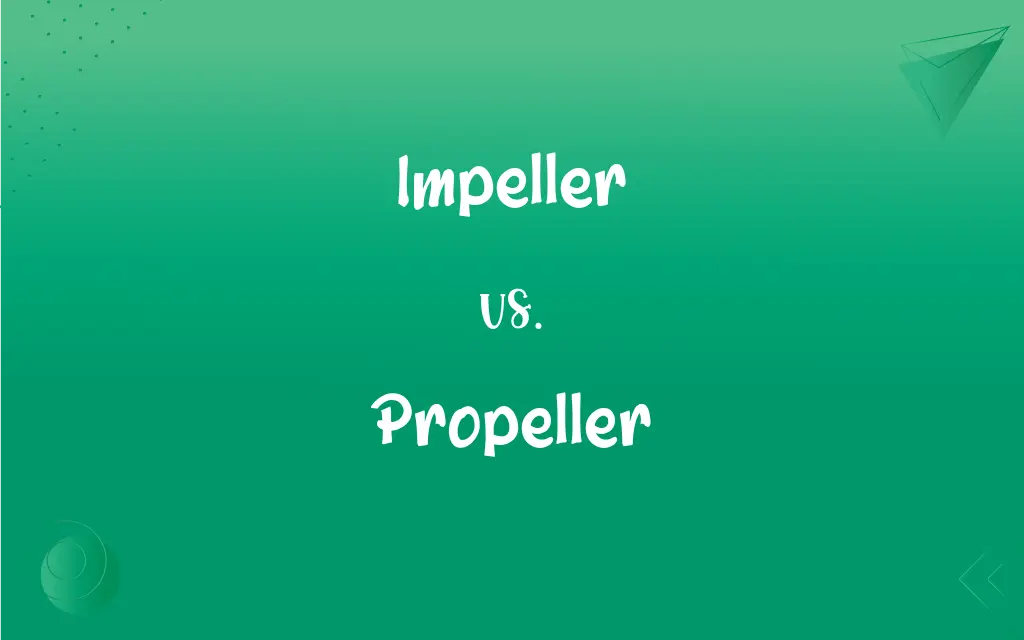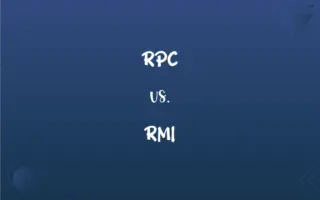Impeller vs. Propeller: What's the Difference?
By Janet White || Published on February 8, 2024
An impeller is a rotating component within a system, used to drive fluid flow, while a propeller is an external device with blades rotating in air or water to propel a vehicle.

Key Differences
Impellers are primarily used to move fluids within a system, functioning inside pumps, compressors, or other machinery. Propellers, on the other hand, are external devices designed to move a vehicle through a medium like air or water by rotating and creating thrust.
The design of an impeller is such that it resides within the confines of a tube or a similar structure, ensuring fluid moves through the system efficiently. Propellers are externally mounted, with blades exposed to the medium they are designed to move through, like the propellers on boats or airplanes.
Impellers convert the energy from a motor to energy in a fluid, creating flow and pressure within a system. Propellers convert engine power into thrust in an open environment, propelling vehicles forward or upward.
Impellers are found in various applications like water pumps, jet engines, and HVAC systems, where moving fluid is essential. Propellers are synonymous with transportation, seen on boats, submarines, helicopters, and airplanes, where movement through a medium is required.
Impellers usually have a series of curved vanes or blades on a central shaft, designed for optimal fluid flow. Propellers consist of two or more long, narrow blades arranged around a central hub, designed to cut through the air or water efficiently.
ADVERTISEMENT
Comparison Chart
Location
Internal in systems
External on vehicles
Medium
Moves fluid (liquid or gas)
Propels through air or water
Design
Curved vanes/blades inside a casing
Exposed blades on a hub
Function
Creates flow and pressure in fluids
Generates thrust for movement
Typical Use
Pumps, compressors, HVAC systems
Boats, airplanes, helicopters
ADVERTISEMENT
Impeller and Propeller Definitions
Impeller
Creates pressure in fluids.
The impeller in the hydraulic system increases the fluid pressure.
Propeller
Enables vehicles to move.
The airplane's propeller started spinning, preparing for takeoff.
Impeller
Converts mechanical energy to fluid motion.
The impeller in the jet engine turns fast, moving air efficiently.
Propeller
A bladed device for propulsion.
The drone's small propellers lifted it smoothly into the air.
Impeller
A rotating part of a pump.
The impeller in the water pump ensures consistent flow.
Propeller
Transforms engine power into motion.
The ship's propeller transformed the engine's power
Impeller
An integral part of mechanical systems.
The malfunctioning impeller caused the machine to overheat.
Propeller
A device for creating thrust in air or water.
The boat's propeller cut through the water, speeding up the vessel.
Impeller
A device for moving fluid.
The impeller in the air conditioner circulates cool air.
Propeller
A device for propelling an aircraft or boat, consisting of a spinning shaft with radiating angled blades that thrust air or water in the direction opposite the desired direction of travel.
Impeller
One that impels, as a rotating device used to force a fluid in a desired direction under pressure.
Propeller
One who, or that which, propels.
Impeller
A rotor or rotor blade.
Impeller
Something which or someone who impels.
Impeller
A rotating component that accelerates fluid outward from a center of rotation, found in devices such as pumps, water jets, washing machines, and agitated tanks.
Impeller
One who, or that which, impels.
Impeller
The blade of a rotor (as in the compressor of a jet engine)
FAQs
Can propellers be silent?
Completely silent operation is challenging, but designs can minimize noise.
Do all boats use propellers for movement?
Most do, but some specialized boats use other means like jet propulsion.
What is a key consideration in impeller design?
Ensuring efficient fluid flow and minimizing energy loss are crucial.
How does fluid viscosity affect impeller performance?
Higher viscosity fluids require impellers with more torque to move the fluid effectively.
How does an impeller differ from a rotor?
Impellers are specific to fluid movement, while rotors can refer to a broader range of rotating devices.
Is the design of an impeller customizable?
Yes, impellers can be custom-designed for specific applications and fluid characteristics.
Can impellers be used for heating systems?
Yes, they can circulate hot water or air in heating systems.
How do ice and debris affect propellers?
They can cause damage or reduced efficiency and require robust design considerations.
Are propellers always visible on a vehicle?
Mostly, but some designs may partially encase them for protection or efficiency.
Are there environmental concerns with propeller use?
Yes, such as the impact on marine life and noise pollution.
How does blade count affect a propeller's performance?
More blades can provide smoother operation but may reduce efficiency.
Can propeller design affect fuel efficiency?
Yes, efficient designs can reduce fuel consumption.
Are impellers used in renewable energy technologies?
Yes, especially in hydro and wind turbines.
How do reversible propellers work?
They can change the pitch of the blades to reverse thrust, used for braking or reverse movement.
Do propellers work differently at high altitudes?
Yes, thinner air at high altitudes can affect propeller efficiency and design requirements.
What's the lifespan of an impeller?
It varies, but regular maintenance can extend its life.
Can impellers be 3D printed?
Yes, with advancements in technology, 3D printing of impellers is possible.
Are propeller-driven vehicles faster than jet-driven ones?
Typically, jet-driven vehicles are faster, but it depends on the specific design and use case.
How are impellers tested for performance?
Through fluid dynamics simulations and physical testing in controlled environments.
What's the role of an impeller in a jet engine?
It compresses the air entering the engine, crucial for the engine's thrust.
About Author
Written by
Janet WhiteJanet White has been an esteemed writer and blogger for Difference Wiki. Holding a Master's degree in Science and Medical Journalism from the prestigious Boston University, she has consistently demonstrated her expertise and passion for her field. When she's not immersed in her work, Janet relishes her time exercising, delving into a good book, and cherishing moments with friends and family.
































































